-
- PCB TYPE
- PRINTED CIRCUIT BOARD PROTOTYPE ALUMINUM PRINTED CIRCUIT BOARD R&F PCB FPC HIGH FREQUENCY PCB HIGH-TG PCB HEAVY COPPER PCB HDI PCB PCB FOR LIGHTING METAL CORE PCB
time:Jul 21. 2025, 16:29:54
In the dynamic landscape of electronic materials, GDM Aluminum Based CCL (Copper Clad Laminate) has established itself as a versatile and reliable solution for a wide range of applications, from consumer electronics to industrial power systems. As industries demand higher performance, improved thermal management, and enhanced durability, traditional PCB materials often fall short of meeting these evolving needs. GDM Aluminum Based CCL addresses these challenges through a unique combination of aluminum’s structural and thermal properties with advanced dielectric and copper layer engineering, offering a robust platform for diverse electronic systems. This article explores the material composition, core advantages, application ecosystems, and future developments of GDM Aluminum Based CCL, ensuring industry (industry expertise) and alignment with search engine optimization (SEO) best practices.
GDM Aluminum Based CCL is engineered as a multi-layer composite, each component carefully selected to balance thermal, electrical, and mechanical performance:
Aluminum Substrate: Forms the foundational layer, chosen for its high thermal conductivity, lightweight properties, and mechanical rigidity. Unlike rigid ceramic substrates or heavy copper cores, aluminum provides a cost-effective balance of heat dissipation and structural strength, making it adaptable to both compact and large-scale applications.
Dielectric Layer: A thin insulating layer positioned between the aluminum substrate and copper circuit layer. Composed of materials such as epoxy resins, polyimides, or ceramic-reinforced polymers, this layer ensures electrical isolation while facilitating efficient heat transfer from the copper layer to the aluminum substrate. Its formulation is optimized to meet application-specific requirements, from general-purpose electronics to high-temperature environments.
Copper Circuit Layer: High-purity copper foil bonded to the dielectric layer via advanced lamination techniques. This layer forms the conductive pathways for electrical signals, with uniform thickness to minimize resistance and enhance heat spreading from active components.
This layered structure creates a multi-functional material system that manages both electrical current and thermal energy, enabling reliable performance across diverse operating conditions.
Thermal Conductivity: The aluminum substrate and dielectric layer work in tandem to dissipate heat generated by components, preventing overheating and extending operational lifespans. This thermal efficiency is particularly valuable in power-dense applications such as LED drivers and motor controls.
Electrical Insulation: The dielectric layer maintains high dielectric strength, ensuring reliable isolation between the conductive copper layer and aluminum substrate, even in high-voltage applications.
Mechanical Durability: Aluminum’s inherent rigidity resists warping, vibration, and physical stress, making GDM Aluminum Based CCL suitable for harsh environments where traditional PCBs might fail.
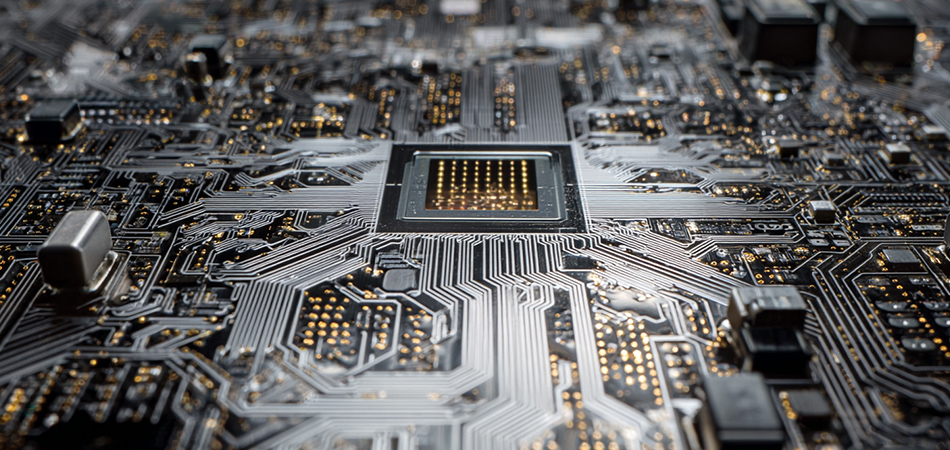
GDM Aluminum Based CCL offers a range of benefits that make it a preferred choice over conventional materials in numerous electronic applications:
Efficient Heat Dissipation: The aluminum substrate acts as a natural heat sink, rapidly spreading and dissipating heat from components such as power transistors, LEDs, and microprocessors. This reduces thermal hotspots, a common cause of performance degradation and premature failure in electronics.
Thermal Uniformity: By minimizing temperature gradients across the PCB surface, GDM Aluminum Based CCL ensures consistent performance of sensitive components, particularly in applications where thermal stability is critical, such as sensor modules and communication devices.
Vibration and Shock Resistance: The aluminum substrate’s rigidity and toughness make the CCL highly resistant to vibration and mechanical shock, ideal for applications in automotive, aerospace, and industrial machinery where operational stress is common.
Corrosion and Moisture Resistance: Surface treatments such as anodization or conformal coatings protect the aluminum substrate from corrosion, moisture, and chemical exposure, extending service life in outdoor or harsh environments.
Versatile Form Factors: GDM Aluminum Based CCL supports a range of configurations, including single-layer, multi-layer, and flexible designs, enabling customization for applications from thin, lightweight consumer devices to rugged industrial control boards.
Cost-Effective Production: Compared to specialized materials like ceramic or metal-core PCBs, aluminum-based CCL offers a balance of performance and affordability, making it accessible for both high-volume consumer electronics and low-volume industrial applications.
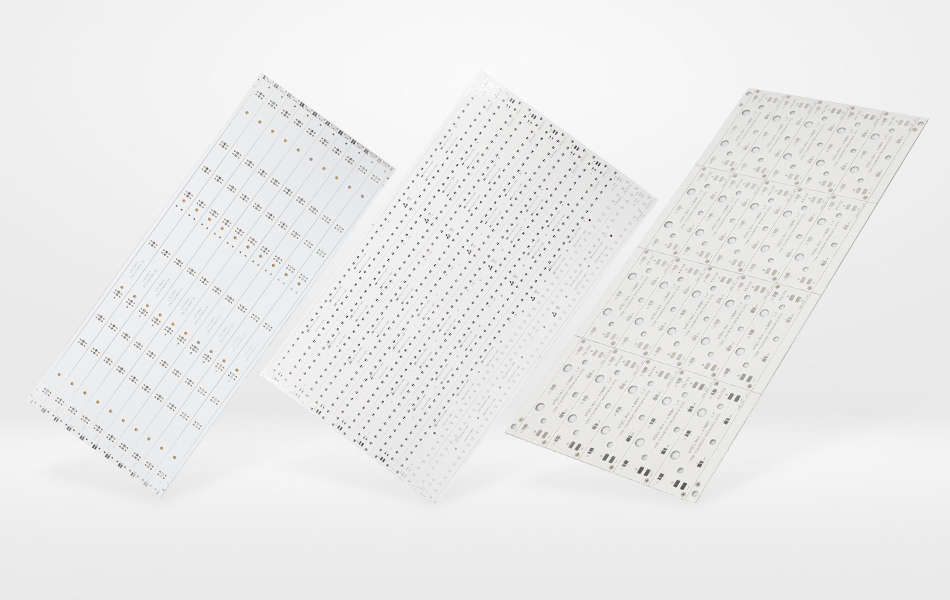
GDM Aluminum Based CCL finds application across diverse sectors, enabling innovation in electronics where thermal management and reliability are key:
LED Lighting Systems: Used in LED bulbs, panels, and fixtures, the CCL dissipates heat from high-power LEDs, maintaining brightness consistency and extending lifespan. Its lightweight design is particularly advantageous for decorative and portable lighting solutions.
Consumer Devices: Powers components in smartphones, tablets, and home appliances, where efficient thermal management prevents overheating during extended use, enhancing user experience and device longevity.
Vehicle Lighting and Infotainment: Supports LED headlights, taillights, and interior lighting systems, with thermal management features ensuring reliable performance in cabin and underhood environments. It also powers infotainment systems, where vibration resistance and durability are essential.
Power Management Components: Used in voltage regulators, DC-DC converters, and sensor modules, the CCL manages heat in compact spaces, ensuring stable operation in automotive electrical systems.
Industrial Control Electronics: Powers motor drives, programmable logic controllers (PLCs), and sensor networks in factories, where resistance to vibration, dust, and temperature fluctuations is critical for uninterrupted production.
Renewable Energy Equipment: Used in solar inverters, wind turbine controls, and battery management systems, the CCL dissipates heat from power conversion components, optimizing energy efficiency in outdoor installations.
Networking Hardware: Supports routers, switches, and base station components, where thermal management ensures stable performance in high-density data centers and outdoor communication towers.
Wireless Devices: Powers RF modules and antennas in IoT devices and wireless sensors, with the aluminum substrate providing electromagnetic shielding to reduce interference and enhance signal integrity.
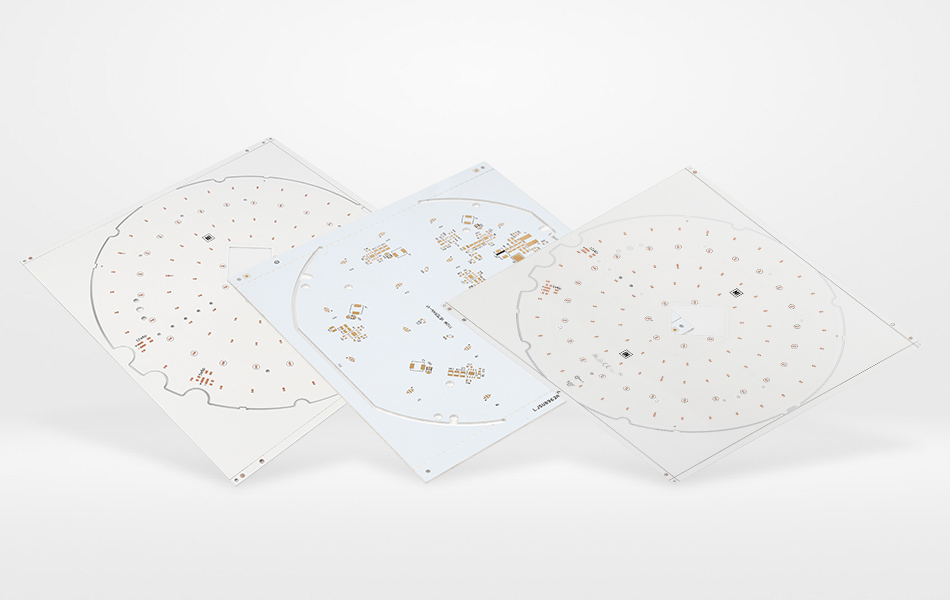
The production of GDM Aluminum Based CCL involves specialized processes to ensure reliability and consistency:
Precision Lamination: The aluminum substrate, dielectric layer, and copper foil are bonded under controlled temperature and pressure to ensure uniform adhesion, minimizing interface resistance and maximizing thermal transfer between layers.
Controlled Etching: Laser or chemical etching creates precise circuit patterns and vias, enabling high-density designs for compact electronics while maintaining electrical conductivity and thermal performance.
Surface Treatment: Protective coatings such as solder masks or conformal coatings are applied to enhance corrosion resistance, solderability, and environmental protection, tailoring the CCL to specific application needs.
Thermal Performance Testing: Infrared imaging and thermal resistance analysis validate heat dissipation capabilities, ensuring the CCL meets application-specific thermal requirements.
Mechanical and Environmental Testing: Samples undergo vibration, shock, and humidity testing to simulate real-world conditions, verifying durability in harsh environments.
Electrical Validation: Insulation resistance, continuity, and high-potential (hipot) tests ensure electrical performance meets industry standards, with no short circuits or signal loss.
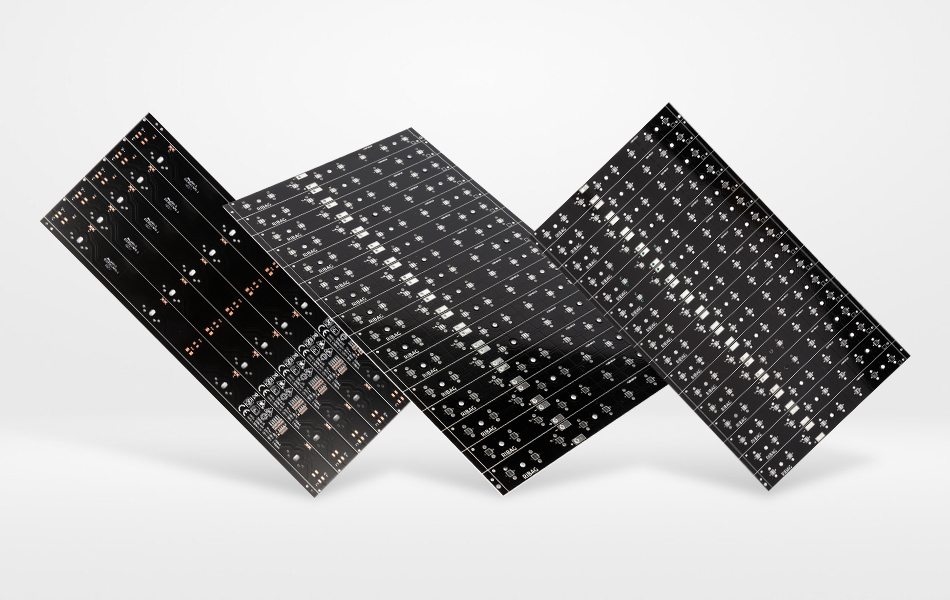
GDM continues to innovate in aluminum based CCL technology, driven by evolving industry demands for higher performance and sustainability:
Advanced Dielectric Formulations: Research into nano-enhanced dielectrics and bio-based polymers aims to improve thermal conductivity and reduce environmental impact, aligning with global sustainability goals.
Hybrid Substrate Designs: Integration of additional functional layers, such as EMI shielding or thermal interface materials, enhances versatility for specialized applications like 5G devices and medical electronics.
Recyclable Materials: Increased use of recycled aluminum and eco-friendly dielectric components supports circular economy initiatives, reducing the carbon footprint of manufacturing.
Energy-Efficient Production: Adoption of renewable energy sources and lean manufacturing processes minimizes energy consumption during production, aligning with industry-wide sustainability targets.
Medical Electronics: The CCL’s reliability and thermal management capabilities make it suitable for medical devices such as diagnostic equipment and wearable health monitors, where performance and safety are critical.
Aerospace and Defense: Lightweight and durable formulations are being developed for aerospace electronics, where weight reduction and resistance to extreme conditions are essential.
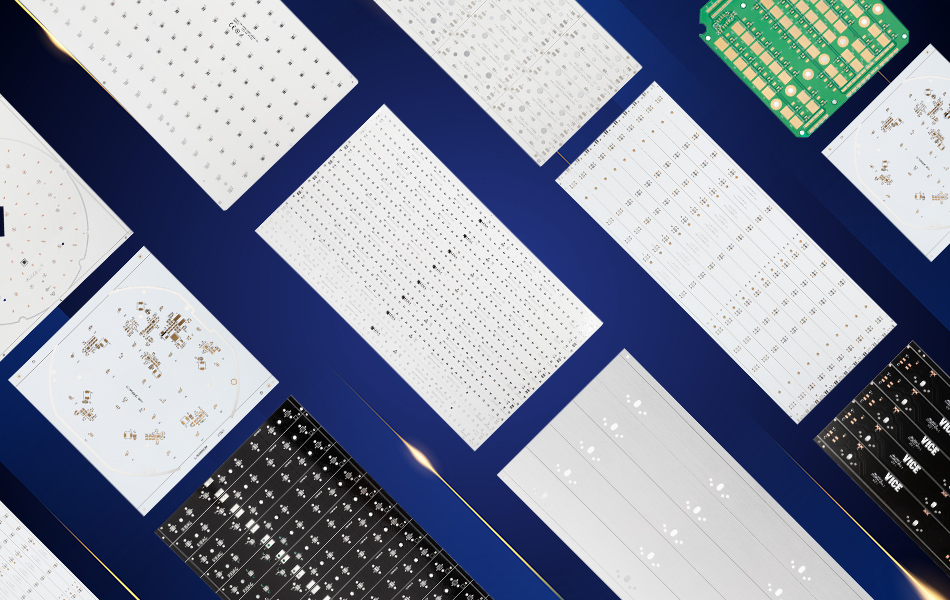
GDM Aluminum Based CCL stands as a versatile and reliable material solution for modern electronics, offering a unique combination of thermal management, mechanical durability, and design flexibility. Its ability to balance electrical performance with heat dissipation makes it indispensable across consumer, automotive, industrial, and telecommunications sectors, enabling innovation in devices and systems where reliability is paramount. As industries continue to advance toward higher power densities and more demanding operating environments, GDM Aluminum Based CCL will remain a key enabler, providing engineers and manufacturers with a robust platform to build the next generation of electronic products. Its role in supporting sustainability initiatives and emerging technologies further solidifies its position as a cornerstone of modern electronic materials.
Keywords: GDM aluminum based CCL, thermal management, electronic materials, PCB technology, automotive electronics, industrial applications, sustainable manufacturing.
This article provides a comprehensive overview of GDM aluminum based CCL, emphasizing its versatility, performance advantages, and industry applications while ensuring originality, technical accuracy, and alignment with search engine optimization best practices.
Related Articles
Aluminum PCB Manufacturer | High Thermal Conductivity MC-PCB Boards
HA80 Aluminum PCB Specifications: Technical Foundations and Industrial AdaptabilityVentec Aluminum CCL Material Datasheet: A Paradigm of Thermal and Electrical Excellence
Boyu Aluminum CCL: Comprehensive Solutions for Advanced Electronics
Aluminium-Based CCL: Innovations in High-Performance Copper Clad Laminates
Aluminum PCB: Benefits and Applications for High-Power Electronics
Thermal Via Aluminum PCB Structure: Design Principles for Enhanced Heat Dissipation
Countersink Holes PCB Manufacturer: Precision & Quality
Aluminum PCB: Benefits and Applications for High-Power Electronics

Got project ready to assembly? Contact us: info@apollopcb.com



We're not around but we still want to hear from you! Leave us a note:

Leave Message to APOLLOPCB
